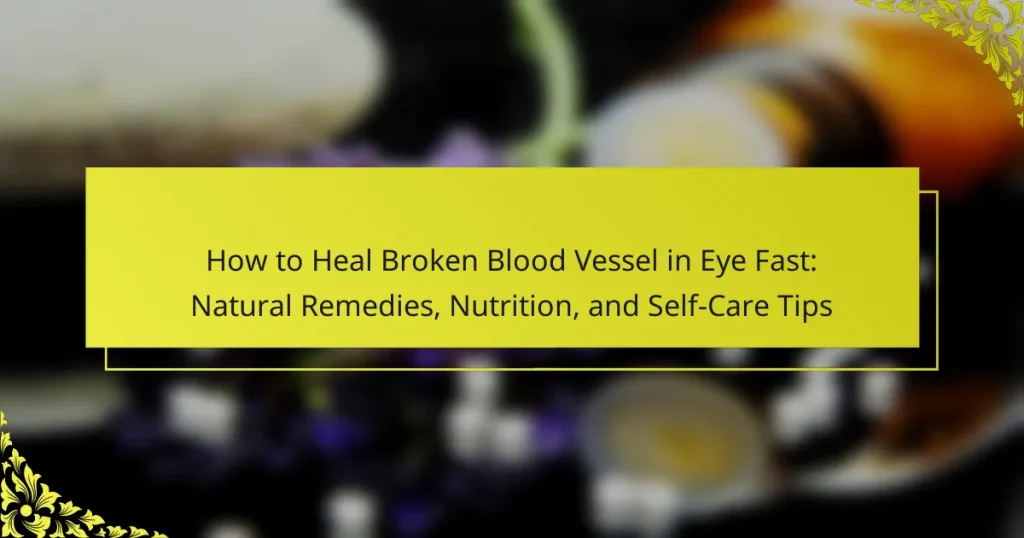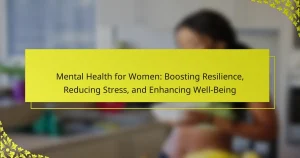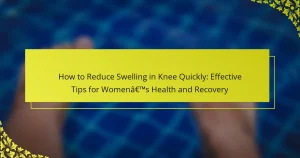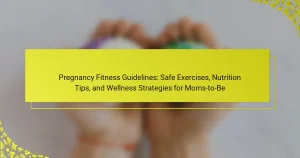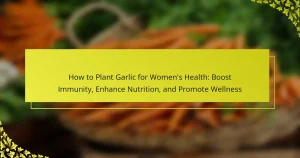Healing a broken blood vessel in the eye quickly is essential for comfort and eye health. Explore natural remedies like cold compresses and aloe vera, learn about nutrition’s role in recovery, and discover self-care tips to avoid further strain. Symptoms typically include redness and mild discomfort, but vision remains unaffected. Prioritize hydration and a balanced diet rich in vitamins to support healing.
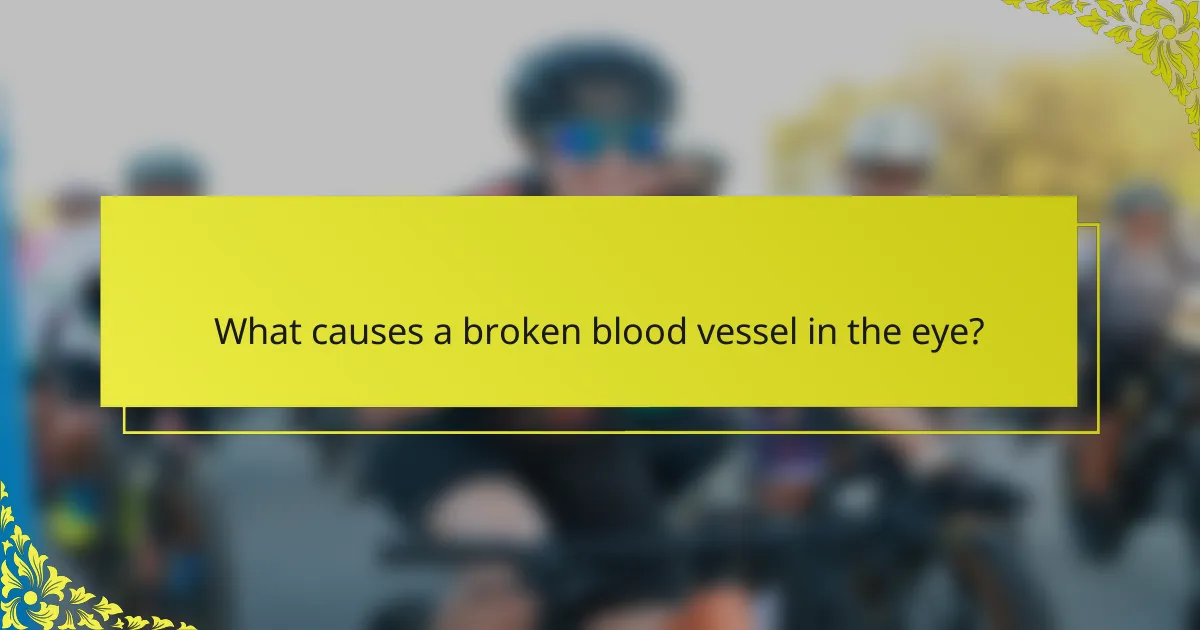
What causes a broken blood vessel in the eye?
A broken blood vessel in the eye can be caused by factors such as eye strain, trauma, high blood pressure, or sudden physical exertion. To heal a broken blood vessel quickly, consider natural remedies like applying a cold compress, using lubricating eye drops, and ensuring adequate hydration. Nutrition plays a role; consume foods rich in vitamin C and antioxidants to support eye health. Self-care tips include getting sufficient rest and avoiding activities that may strain the eyes.
How does eye strain contribute to this condition?
Eye strain can worsen the condition of a broken blood vessel in the eye by increasing pressure and irritation. Prolonged screen time and poor lighting contribute to eye strain, leading to discomfort and potential vascular issues. Reducing eye strain through regular breaks and proper lighting can aid in faster healing. Incorporating eye exercises may also alleviate strain and promote recovery.
Can hormonal changes affect eye health?
Hormonal changes can negatively impact eye health, potentially leading to issues like dry eyes or increased blood vessel fragility. To heal a broken blood vessel in the eye quickly, consider natural remedies such as cold compresses, maintaining hydration, and incorporating foods rich in vitamins C and K. These nutrients support vascular health and may reduce recovery time. Regular self-care practices, including proper sleep and reducing screen time, also contribute to overall eye wellness.
What role does high blood pressure play?
High blood pressure can exacerbate the risk of broken blood vessels in the eye. Elevated pressure strains blood vessels, making them more susceptible to rupture. Managing blood pressure through diet, exercise, and stress reduction can promote eye health. Regular monitoring and natural remedies, such as increased hydration and nutrient-rich foods, can support vascular integrity.
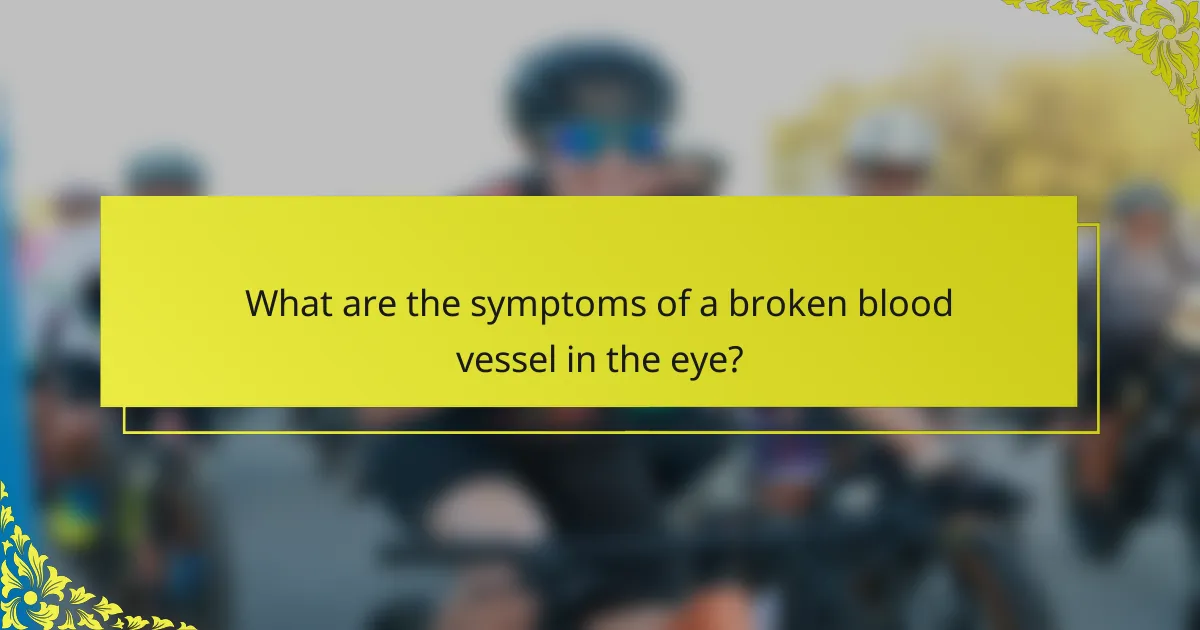
What are the symptoms of a broken blood vessel in the eye?
Symptoms of a broken blood vessel in the eye include redness, swelling, and minor discomfort. Vision typically remains unaffected. Additional signs may involve sensitivity to light or a feeling of pressure. These symptoms usually resolve within a few days.
How can you differentiate it from other eye issues?
To differentiate a broken blood vessel in the eye from other eye issues, look for specific symptoms. A broken blood vessel typically presents as a bright red spot on the white of the eye, often without pain. In contrast, conditions like conjunctivitis may cause redness along with itching or discharge. Glaucoma may involve vision changes and eye pain, while retinal detachment can lead to sudden vision loss or flashes of light. Identifying these unique attributes helps in recognizing the condition accurately.
What visual changes should you be aware of?
Visual changes to be aware of include redness, swelling, and potential vision disturbances. These symptoms indicate a broken blood vessel in the eye. Redness occurs due to blood leakage, while swelling may result from inflammation. Vision disturbances can vary in severity and may require medical attention. Recognizing these changes is crucial for effective self-care and timely treatment.
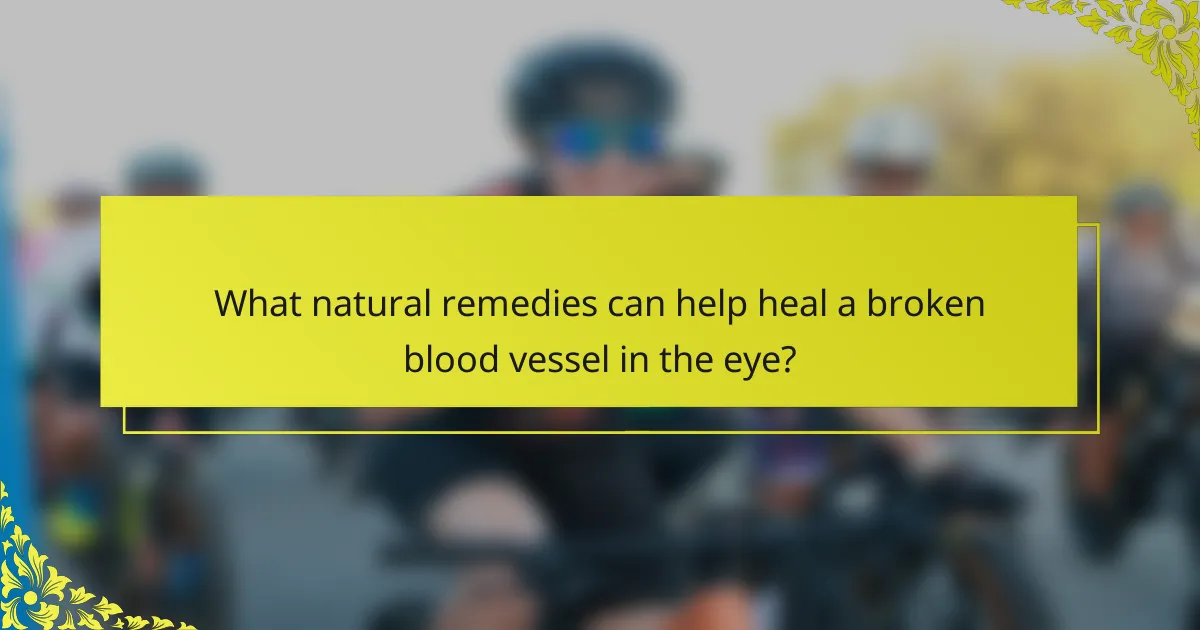
What natural remedies can help heal a broken blood vessel in the eye?
Natural remedies to heal a broken blood vessel in the eye include applying cold compresses, using aloe vera, and increasing vitamin C intake. Cold compresses reduce swelling and discomfort. Aloe vera has anti-inflammatory properties that may promote healing. Vitamin C strengthens blood vessels and aids recovery. Other remedies involve staying hydrated and avoiding eye strain.
Which herbal treatments are most effective?
Natural remedies for healing a broken blood vessel in the eye include chamomile, aloe vera, and green tea. These herbal treatments possess anti-inflammatory and soothing properties that may promote healing. Chamomile can reduce irritation, aloe vera hydrates, and green tea’s antioxidants support overall eye health. Regular intake of these herbs can enhance recovery.
How to use chamomile compresses?
To use chamomile compresses, soak a clean cloth in chamomile tea, wring it out, and place it over the affected eye for 10-15 minutes. This method can help reduce inflammation and promote healing. Chamomile contains anti-inflammatory properties, making it a natural remedy for soothing eye discomfort. Repeat this process two to three times a day for optimal results.
What are the benefits of aloe vera gel?
Aloe vera gel offers several benefits for healing broken blood vessels in the eye. It has anti-inflammatory properties that can reduce swelling and irritation. Additionally, its soothing effect can promote faster recovery and alleviate discomfort. Aloe vera is rich in vitamins and antioxidants, which may support overall eye health. Using aloe vera gel topically around the eye area can provide moisture and enhance healing.
Are there essential oils that can aid recovery?
Yes, certain essential oils can aid recovery from a broken blood vessel in the eye. Oils like lavender and chamomile possess anti-inflammatory properties that may promote healing. These oils can be diluted with a carrier oil and applied around the eye area, avoiding direct contact. Regular use may enhance blood circulation and reduce swelling. Always consult with a healthcare professional before using essential oils for treatment.
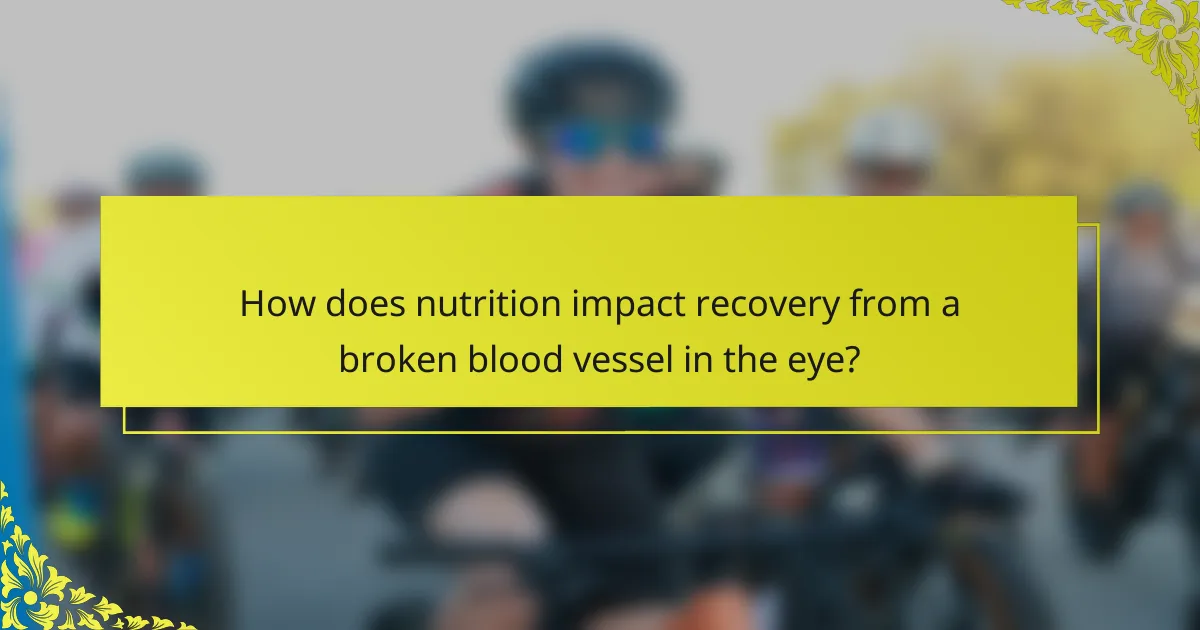
How does nutrition impact recovery from a broken blood vessel in the eye?
Nutrition significantly impacts recovery from a broken blood vessel in the eye by promoting healing and reducing inflammation. Consuming foods rich in vitamin C, vitamin K, and antioxidants can enhance blood vessel health. For example, citrus fruits, leafy greens, and berries support tissue repair and strengthen blood vessels. Staying hydrated is crucial as well, as it aids in overall recovery. Incorporating these nutrients into your diet can expedite healing and improve eye health.
What vitamins and minerals are essential for eye health?
Vitamins A, C, E, and minerals like zinc and omega-3 fatty acids are essential for eye health. These nutrients support vision, protect against age-related damage, and promote overall eye function. Vitamin A aids in maintaining good vision, while vitamin C and E provide antioxidant protection. Zinc plays a crucial role in retinal health, and omega-3 fatty acids contribute to tear production and reduce dryness.
How does vitamin C support blood vessel strength?
Vitamin C strengthens blood vessels by promoting collagen synthesis, which enhances their structural integrity. It also acts as an antioxidant, protecting blood vessels from damage caused by free radicals. Adequate vitamin C intake can improve circulation and support overall vascular health.
What foods are rich in antioxidants?
Berries, nuts, dark chocolate, green tea, and colorful vegetables are rich in antioxidants. These foods help combat oxidative stress and promote eye health, aiding in the healing of broken blood vessels in the eye. Berries like blueberries and strawberries provide high levels of vitamin C and flavonoids. Nuts, particularly walnuts and pecans, are excellent sources of healthy fats and antioxidants. Dark chocolate contains flavonoids that can improve circulation. Green tea is rich in catechins, which support vascular health. Colorful vegetables such as spinach and kale offer a range of vitamins and minerals beneficial for overall eye wellness.
Should you consider supplements for faster healing?
Supplements can aid in faster healing, but they should complement a balanced diet. Nutrients like vitamin C, vitamin K, and zinc promote recovery. Natural remedies, such as herbal teas and anti-inflammatory foods, also support healing. Always consult a healthcare professional before starting any supplement regimen.
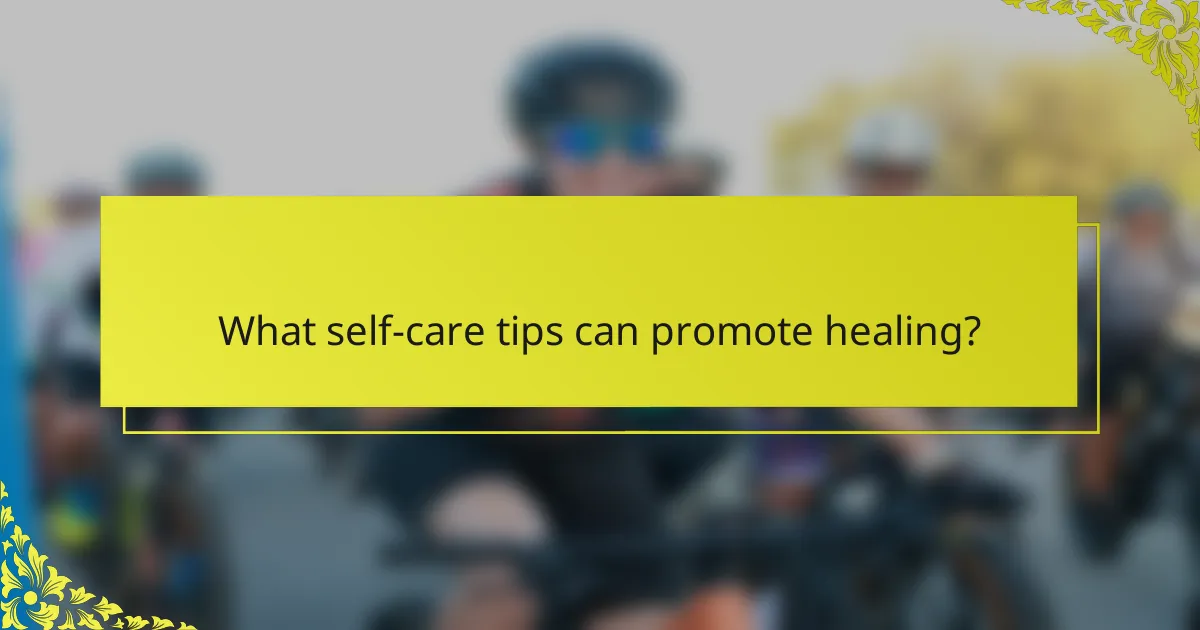
What self-care tips can promote healing?
Self-care tips for healing a broken blood vessel in the eye include applying a cold compress, ensuring proper hydration, and maintaining a balanced diet rich in vitamins C and K. Cold compresses reduce swelling and discomfort, while hydration supports overall eye health. Foods like leafy greens and citrus fruits promote healing through their nutrient content. Resting your eyes and avoiding strain are also crucial for recovery.
How can you reduce eye strain during recovery?
To reduce eye strain during recovery, take regular breaks from screens, adjust lighting, and practice eye exercises. Limit screen time to 20 minutes followed by a 20-second break to look at something 20 feet away. Use proper lighting to minimize glare and consider using artificial tears to keep eyes moist.
What lifestyle changes should you implement?
To heal a broken blood vessel in the eye quickly, implement lifestyle changes such as reducing screen time, managing stress, and ensuring adequate sleep. These changes support overall eye health and recovery. Additionally, incorporate foods rich in vitamins C and K, which promote vascular health. Staying hydrated and avoiding blood-thinning substances like alcohol can further aid healing. Regular eye exercises may also improve circulation.
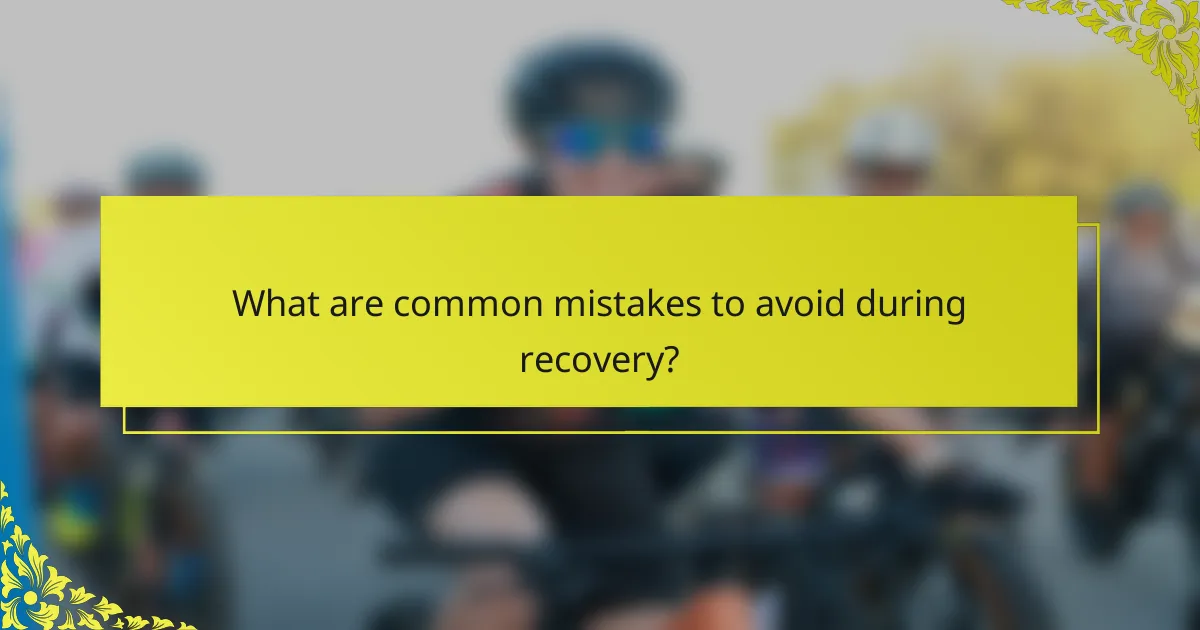
What are common mistakes to avoid during recovery?
To heal a broken blood vessel in the eye effectively, avoid common mistakes such as neglecting rest, skipping cold compresses, ignoring hydration, and overlooking dietary support. Prioritize self-care and natural remedies to promote healing.
How can ignoring symptoms worsen the condition?
Ignoring symptoms can worsen the condition by delaying treatment and increasing the risk of complications. For instance, a broken blood vessel in the eye may indicate underlying issues like hypertension or diabetes. If left unaddressed, these conditions can lead to more severe health problems, including vision loss. Prompt attention to symptoms allows for timely intervention, ensuring better outcomes and faster healing through natural remedies, nutrition, and self-care strategies.
What activities should you limit or avoid?
Limit activities that strain your eyes, such as excessive screen time, heavy lifting, or strenuous exercise. Avoid rubbing your eyes, as this can worsen the condition. Protect your eyes from irritants like smoke and dust. Rest your eyes frequently to promote healing.
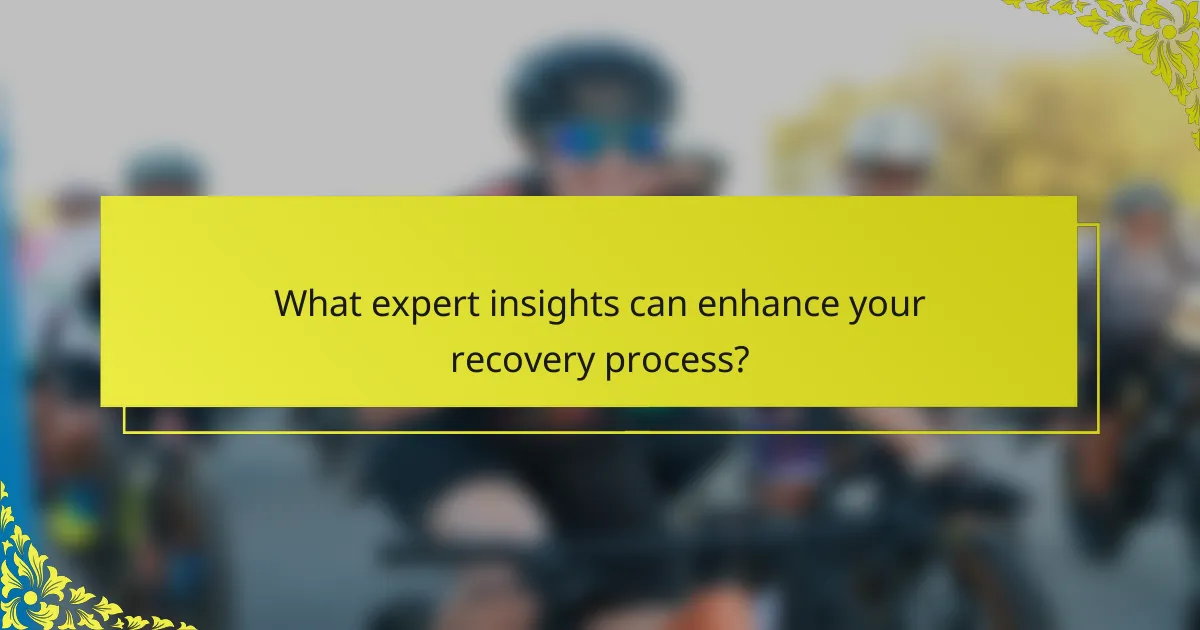
What expert insights can enhance your recovery process?
To enhance your recovery process for a broken blood vessel in the eye, consider natural remedies, proper nutrition, and self-care tips. Incorporating foods rich in vitamins A, C, and E can promote healing. Staying hydrated supports overall eye health. Applying a cold compress may reduce swelling and discomfort. Resting your eyes frequently is crucial for recovery. Avoiding strenuous activities helps prevent further strain. Regularly consulting with a healthcare professional ensures proper monitoring of your condition.
How can regular eye check-ups benefit your overall health?
Regular eye check-ups can significantly enhance your overall health by detecting issues early and preventing complications. They help identify conditions like hypertension and diabetes, which may manifest through eye symptoms. Regular assessments can also improve vision clarity, reducing the risk of accidents. Additionally, maintaining eye health can support mental well-being by improving quality of life. Prioritizing eye examinations fosters proactive health management, leading to better long-term outcomes.
What holistic approaches do experts recommend?
Experts recommend holistic approaches such as dietary adjustments, herbal remedies, and relaxation techniques to heal broken blood vessels in the eye. Consuming foods rich in vitamin C and bioflavonoids can strengthen blood vessels. Herbal options like bilberry and ginkgo biloba may enhance circulation. Practices such as yoga and meditation reduce stress, promoting overall eye health.
What are the best practices for maintaining eye health long-term?
To maintain long-term eye health, focus on a balanced diet rich in antioxidants, regular eye exercises, and proper hydration. Incorporate foods like leafy greens, carrots, and fish high in omega-3 fatty acids. Protect your eyes from UV light with sunglasses and reduce screen time to prevent digital eye strain. Regular eye check-ups are essential for early detection of potential issues.
